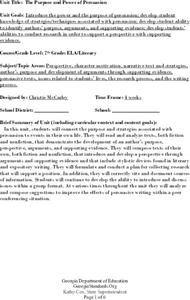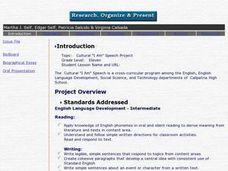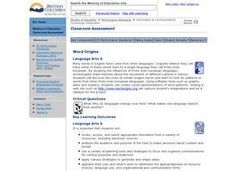Curated OER
The Lion, The Witch, and The Wardrobe: A Literature Evaluation Project
Sixth graders read and analyze The Lion, The Witch, and The Wardrobe. They study the elements of literature found in the book. Students create an elements of literature flip book that shows the various elements of literature in the novel.
Curated OER
What Are Legal Briefs?
Twelfth graders read examples of legal briefs and identify their components. Using the text, they develop a list of the components necessary for a brief and which ones they are going to use in the mock court activities. They also...
Curated OER
Historical Puppet Play
Fourth graders analyze the book Train to Midnight, based on the Underground Railroad. They compose and perform a puppet play based on the book. Students perform and videotape their puppet plays.
Curated OER
How To Read A Movie
Ninth graders respond to films they have seen using literary, dramatic, and cinematic terms. They reevaluate their role as a moviegoer. Students analyze their favorite film in order to discover what good films have in common.
Curated OER
Encounter with a Skull (Tae dokuro, 1890)
Students read and analyze a short story by Koda Rohan. They conduct research, read and discuss a biography of the author, identify examples of Japanese and Buddhist symbolism in the story, and write an original story.
Curated OER
Author Cards
Eighth graders create an informational card for a selected author. They read and analyze a book by their chosen author, conduct research about the author, and create an author card that includes a written critical response to the...
Curated OER
Science Happens in a Social Context
Students discuss how the same data is viewed differently between historians and scientists. Using the data, they compare and contrast the vocabulary used and the focus of attention. They analyze the conditions that help spread diseases...
Curated OER
Seeing Is Believing
Students research and describe the stories of Thomas Jefferson, Meriwether Lewis and William Clark. They analyze historical sources from different points of view and present an analysis of two historical contexts.
Curated OER
The Purpose and Power of Persuasion
Seventh graders are introduced to and discuss the power of persuasion. After reading text, they identify the author's purpose, perspective and argument. They write their own fiction and non-fiction texts and develop a perspective after...
Curated OER
A Man of Integrity and Courage
Students read one of the most important articles in modern medical history on the importance of conducting research in an ethical manner that includes participants who give informed consent.
Curated OER
Poetry Movies
Students research, analyze, and describe a poem using the Internet and a variety of technology applications in this Language Arts lesson for the High School classroom. Emphasis is placed on the creation of a Keynote or PowerPoint...
Curated OER
Multicultural Fairy Tales
Third graders explore the elements of a story using fairy tales from all over the world. They compare and contrast story elements, key ideas and concepts found in a variety of texts from around the world.
Curated OER
Prediction Using On-Line Stories!
Fifth graders analyze the elements of an online story. In this online story instructional activity, 5th graders analyze the title, pictures, and other information for an online story. Students predict what the text is about and complete...
Curated OER
Research Activity for the Legal Brief
Students use extensive information about previous cases with related themes and depositions on the Street Law web site to gather information that will be used to write an effective appeals brief for whichever party in the case their...
Curated OER
Cultural "I Amm" Speech Project
Eleventh graders use the internet and other sources to research a selected individual. They explore important events, challenges, and the impact and influence the person had on US History. Using the information gathered, 11th graders...
Curated OER
Language Arts- Word Origins
Sixth graders locate, access, and select appropriate information from a variety of resources, including electronic sources. They analyze the audience and purpose of the task to make decisions about content and format.

















